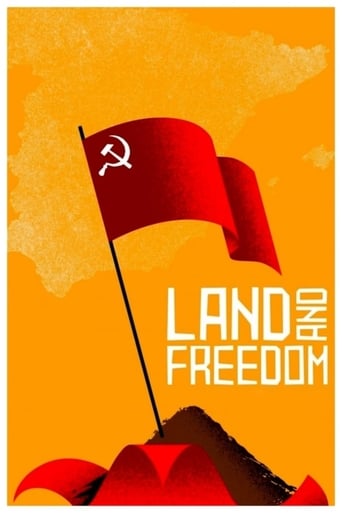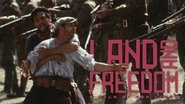Antonius Block
Land and Freedom is a British drama, directed by the English left-wing director Ken Loach, with a script written by playwright Jim Allen. His and Ken Loach's Marxist, Trotskyist, and anti-Stalinist orientations are evidently present in the film, although it is arguably the theme of Stalinist repression of anti-franquist communist and anarchist militias in Spain during the Civil War, to be mainly portrayed. In the end, given the several disputes and scuffles between the various anti-Franco factions, we wonder, with the director: What is the point to all this? The story develops through flashbacks, and it recounts of a David Carr, a British unemployed member of the Communist Party from Liverpool, who decides to go and fight the cause of the anti-franquist movement in the Spanish Civil War. The narration takes place through some letters Carr wrote, newspaper clippings, and other documents he collected, found and read by his granddaughter, right after his death. The film rides the wave of the leftoid socio-political movement of the 90's, as already mentioned in this blog, with regards to La Haine and, similarly to the French film, this socio-political situation contributes greatly to its success, especially amongst certain circles.Other themes present in the film are the anti-Clericalism, revealed with the summary execution of the priest culpable of exposing the militians to the Franquist; rudimentary feminism, given the fact that in the POUM, men and women fight together; and finally, the socialist matrix also appears, especially in the village assembly scene, where the peasants vote for the collectivization of the land. This scene is arguably one of the best of the entire movie; Loach's pursue of realism reaches its apex here. The camera loses its perspective, and plunges the viewer right into the live situation, and the dialogues are apt and poignant, also considering that most of the actors participating to this scene were non-professionals.
Polaris_DiB
This film is structured basically the same way as Loach's most recent work, "The Wind that Shakes the Barley": a group of people manage to successfully win a battle against an enemy regime, and then starts to faction and dissolve slowly, eventually culminating in tragedy. "Land and Freedom", however, is a bit stronger and a lot smarter.It's obvious from these two movies that Loach is a leftist, but unlike most people who make political works for one side or the other, Loach has a strong understanding of the failings and weaknesses of his own politics. His movies often have moments of straightforward political debate, but he never lets any side seem less important than any other. He is one of those rare people who can analyze all of the issues from many directions, and underline the most important parts of what each side needs and what each side can't have.Loach also has a technique of making initial moments of militarism or violence seem rather childlike, like boys with toy guns running through hillsides and enjoying each other's company. These moments always precede direct damage to members of the group, and in "Land and Freedom", seeing the militia slowly fall apart is very disturbing. Loach also cleverly illustrates the difficulties of revolution from the perspective of the volunteers, as they start fighting for one cause and then find themselves on the opposite end of the barrel against their friends and neighbors.I've only recently begun watching the movies of Ken Loach, but I really admire the way he writes and directs his movies. He is definitely a very important filmmaker.--PolarisDiB
lastliberal
The United States does a lot of good in the world. No one can deny that fact. But, anyone who believes in the canard that America is a believer in democracy only has to look at our government's support of the fascists in Miami, in Chile and in Franco's revolt in Spain.For a good history of the military overthrow of the democratically elected government in Spain in 1936, the BBC put together a six-hour miniseries that shows what happened. For the American side, see the documentary "The Good Fight: The Abraham Lincoln Brigade in the Spanish Civil War." Of course, the NAZI's and Italian Fascists used the war as training for their invasion of Europe as they supported Franco's revolt.This is a romantic story of David (Ian Hart) who joins the fight on the side of freedom against the forces of Franco and the Catholic priests, who used women as shields and abused them in their service of the rich landowners. He stays until the end even though he is disillusioned after the involvement of Stalin, which results in the breakup of the Republicans and, of course, the eventual loss of the war.Hart (Breakfast on Pluto, A Cock and Bull Story) was superb in his portrayal of the disillusioned freedom fighter and Rosana Pastor showed great promise as Blanca.Director Ken Loach (McLibel, 11'09''01 - September 11 ) was honored at Cannes for this film.
hiast2
which has to start from and stay with the bottom, base and column of the society.thanks to Ken Loach for this evocative movie about the Spanish civil war and its militias.don't understand the limitation that comments have to be at least 10 lines long. just wanted to make a short and avid comment.OK. then i will recommend interesting literature for those who want to know more about the militias and the anarchistic-syndicalist movement before and during the Spanish civil war:"the short summer of anarchy" by Hans Magnus Enzensberger published by Suhrkamp publishing. a German (don't know if there is an English edition of it) documentary novel about Durruti and his "Solidarios" fighting in the world for their idea of a fair society.







